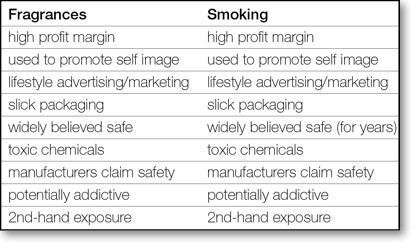

Article

Invasion of the FrankenSCENTS
Last week I went for a four-hour walk in downtown Toronto. Sadly, at no time over the four hours did I go more than five minutes without breathing in some sort of fragrance.
It seems we are a society hooked on fragrances – and oblivious to its risks and problems.
But if YOU care about your health, you should be concerned...
"Along with prior evidence that nearly a third of Americans develop headaches, breathing problems and other symptoms when exposed to scented products, the new findings suggest that efforts to smell nice threaten both your health and the health of people around you."
http://news.discovery.com/human/scented-product-toxic-chemicals.htm
What is fragrance anyway?
In the past: natural oils and compounds found in nature
Now: mostly chemicals synthesized from petrochemicals
Main issues of fragrances
1. Unnatural ingredients
At least 3000 chemicals are used in fragrances
– most have NOT been tested for safety
http://davidsuzuki.org/issues/health/science/toxics/fragrance-and-parfum/
2. Unnatural potency
Humans have never before been exposed to current levels of intense and strong smells
3. Unrelenting exposure
Fragrances are now seemingly ever-present
In the past perfume lasted for around 6 hours. Scents from laundry products can now last for weeks.
Why do we have a sense of smell – from an evolutionary perspective?
• to find food
• to determine if food has gone bad or is poisonous
• to warn us of other things that are poisonous
i.e. a survival tool
Secret ingredients – why?
Fragrance chemicals do not legally have to be disclosed to consumers.
Manufactures say they do not disclose ingredients to protect their formulas.
BUT they also routinely use this to avoid disclosing the use toxic ingredients.
Safety issues with fragrances
Extracted from:
Fragrance: emerging health and environmental concerns.
Betty Bridges
Flavour and Fragrance Journal
Flavour Fragr. J. 2002; 17: 361–371
Fragrances:
-
•can cause, trigger, and exacerbate health conditions
-
•bioaccumulate in human tissue
-
•add to air and water pollution
SKIN
-
•Fragrances are skin allergens, irritants, photosensitizers, and phototoxins
-
•Incidence of skin allergy to fragrance increases with exposure
-
•Ten percent of eczema patients have allergies to fragrances
RESPIRATORY
-
•Fragrances can trigger asthma and other respiratory conditions
-
•Fragrance chemicals can bind with body proteins to form allergens
-
•Fragrance chemicals can cause respiratory sensitization
-
•A 1986 survey found that 72% of asthmatics were triggered by perfume or cologne. Use of chemicals in fragrances has INCREASED since then.
NEUROLOGICAL
-
•Fragrance can impact the brain and nervous system
-
•Toxic materials (from fragrances) can enter the brain through the nose
-
•Fragrance chemicals can:
– increase systolic and diastolic blood pressure
– act on receptors in the brain in a similar manner to alcohol and tobacco
– may trigger addiction mechanisms
SYSTEMIC EFFECTS
Fragrance chemicals:
-
•can cross the placenta
-
•can be found in breast milk
-
•can cause prostate enlargement
OVER DOING IT!
"Those that use scented products on a regular basis may not be able to detect their own fragrance shortly after applying it."
"In many instances they are totally oblivious to the fact that their fragrance is often overwhelming and intrusive to others."
Are "fragrances" the new "smoking"?

Strategy for living in a fragrance-saturated world
1. Avoid ALL fragranced products:
-
•If it has "fragrance" on the label – don't use it
-
•Use unscented, natural products
-
•Essential oils are okay BUT high doses can also be a problem
-
•If it has a smell – use caution!
2. Support ongoing detoxification of the fragrance you are exposed to:
Regularly consume these:
-
•garlic and onions (for sulfur)
-
•beans and legumes (for fibre and methyl groups)
-
•veggies and fruit (for antioxidants)
-
•ground flax seed (for fibre)
-
•water – 2 litres per day minimum
Consider supplementing these nutrients:
-
•vitamin C – at least 2000 mg per day
-
•B vitamins – B50 complex
-
•selenium – 200 mcg per day
-
•zinc – 50 mg per day
-
•a good-quality multivitamin/mineral formula
3. Targeted detoxification
Consider taking chemical and heavy metal detox formulas at least once per year.
Want to know more?
Environmental Working Group
Skin Deep Cosmetics Database
Search more than 69,000 products
Scent of Danger: Are There Toxic Ingredients in Perfumes and Colognes?
http://www.scientificamerican.com/article/toxic-perfumes-and-colognes/
Fragranced Product Information Network
Home | Holistic Nutrition | Talks and workshops | Contact | Articles and recipes

© 2020 Paul Demeda | 2869 Bloor Street West | Toronto, ON M8X 1B3, Canada